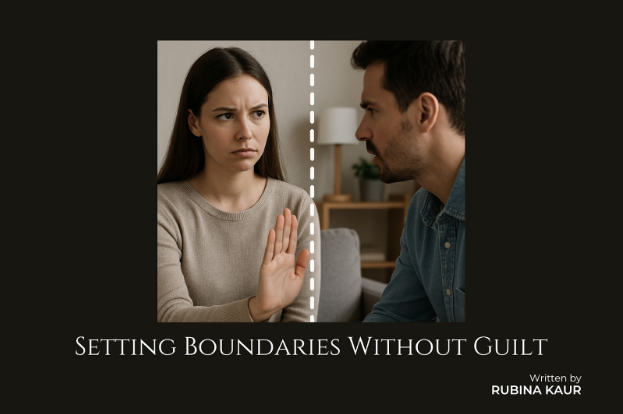








For many people, the word "boundary" feels uncomfortable. We worry that saying no will hurt others, make us appear selfish, or even damage relationships. But the truth is: boundaries are acts of love and self-respect. They protect our mental health, improve relationships, and create emotional balance.
The challenge? Many of us set boundaries with guilt apologizing, overexplaining, or second-guessing ourselves. This blog explores why boundaries matter, why guilt shows up, and how you can start setting boundaries confidently and compassionately.
Boundaries are invisible lines we create to define what's acceptable and what's not in our interactions. They can be physical, emotional, mental, or even digital.
Examples include:
Famous point: Research from the Gottman Institute highlights that clear boundaries are essential for maintaining respect and trust in relationships. Without them, resentment and burnout are almost inevitable.
Guilt often creeps in when setting boundaries because of upbringing and social conditioning. Many of us were taught to prioritize others over ourselves especially in family or cultural contexts where self-sacrifice is valued.
Common reasons for guilt include:
Famous example: Brené Brown, research professor and author, explains that guilt often disguises itself as shame: "We feel guilty not because we did something wrong, but because we believe we are wrong for protecting ourselves."
While guilt may feel heavy at the moment, the long-term cost of no boundaries is far greater.
Consequences include:
Research point: According to the American Psychological Association (APA), people who struggle with boundary-setting are more prone to emotional exhaustion and relationship conflicts.
Here are practical, therapist-backed strategies to set boundaries and release the guilt that follows:
Remind yourself: Boundaries are not rejection they are redirection. You're not pushing people away; you're creating healthier ways to connect.
Practice with low-stakes situations first. For example, politely decline a meeting that isn't necessary. Gradually move toward more personal boundaries.
Instead of blaming, use language that communicates your needs clearly.
Example: "I need some quiet time after work to recharge."
You don't owe lengthy explanations. A simple "I can't commit right now" is enough.
It's normal for others to resist when you change patterns. Stay consistent. Over time, healthy people will respect your boundaries.
Shift focus from "I'm letting them down" to "I'm honoring myself, which helps me show up better for others."
Boundaries not only protect, they heal. They teach us that we are worthy of respect and that self-care is not selfish. When you set a boundary, you're teaching others how to treat you while also modeling healthy behavior for future generations.
Famous point: Oprah Winfrey once said, "You get in life what you have the courage to ask for." Boundaries are exactly that: having the courage to ask for what you need.
Setting boundaries without guilt is a journey, not an overnight fix. Guilt may show up at first, but with practice, it fades and in its place grows confidence, peace, and healthier relationships.
Remember: every time you set a boundary, you're choosing self-respect over self-neglect. And that is one of the most powerful steps you can take for your emotional wellness.
Whether you're looking to strengthen an already healthy relationship or address specific challenges, couples therapy can provide valuable tools for growth and connection. Contact us to learn more about our couples counseling and relationship therapy services.
If this article resonated with you, share it with others who might benefit from these insights.